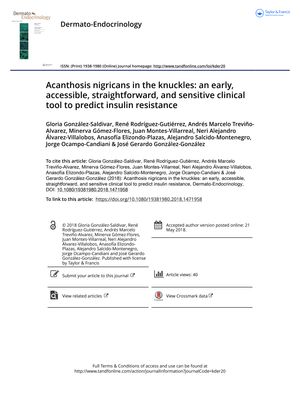Acanthosis Nigricans in the Knuckles: An Early, Accessible, Straightforward, and Sensitive Clinical Tool to Predict Insulin Resistance
January 2018
in “
Dermato-endocrinology
”

TLDR Darkened knuckles can be an early sign of insulin resistance.
In a 2018 study involving 294 young adults aged 18 to 23, researchers discovered that Acanthosis Nigricans (AN) on the knuckles is a significant indicator of insulin resistance (IR). The study included 149 individuals with AN and 145 controls. Those with AN had higher fasting insulin levels (13.45 µU/mL vs. 8.59 µU/mL) and Homeostasis Model Assessment for Insulin Resistance (HOMA-IR) index values (2.86 vs. 1.78) compared to controls, indicating that AN could serve as an early marker for IR. The presence of AN in the knuckles was found to have a sensitivity of 72% and a specificity of 62% for predicting IR. The study concluded that AN in the knuckles is an accessible, straightforward, and sensitive clinical sign for predicting IR, which could be beneficial for early intervention, even in individuals with a normal body mass index (BMI).






